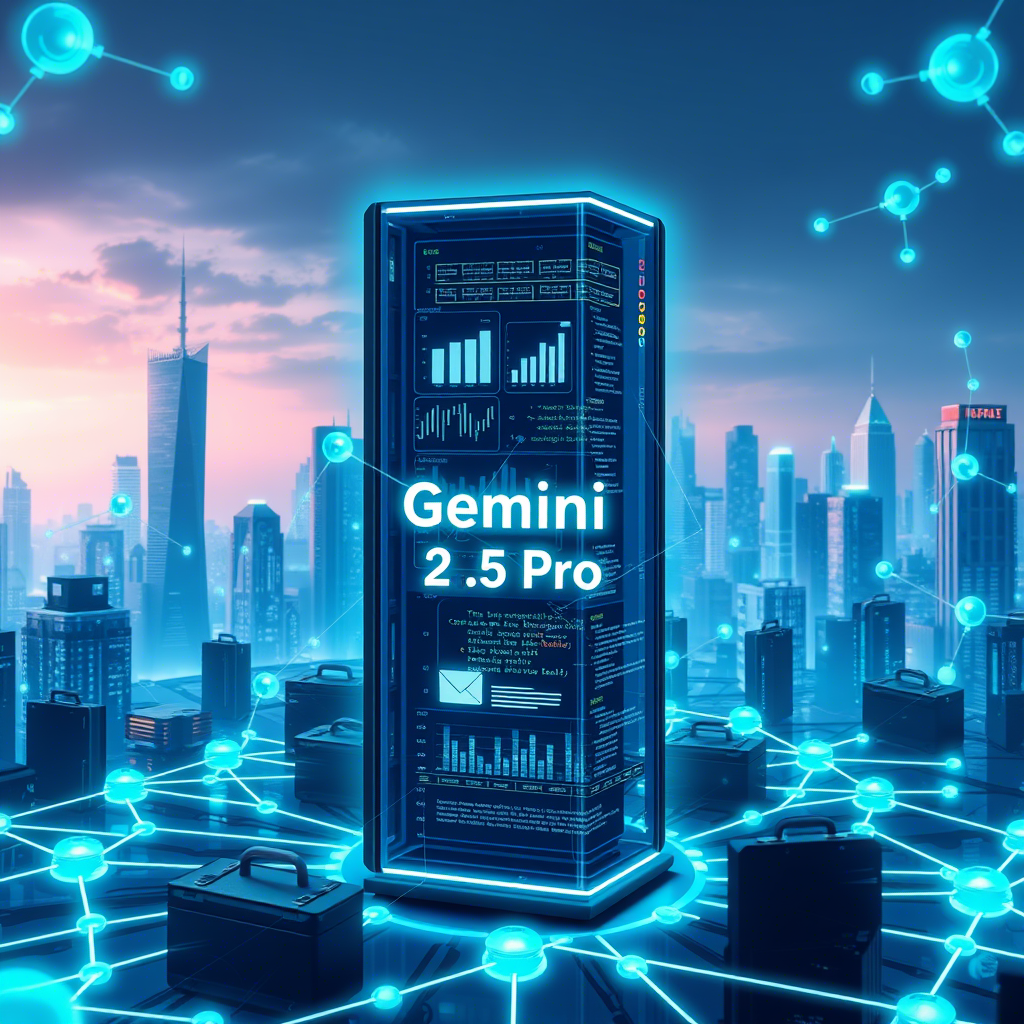In a bold move to solidify its position in the fiercely competitive artificial intelligence (AI) landscape, Google announced on June 17, 2025, that its Gemini 2.5 Pro model is now production-ready, marking a significant milestone for enterprise-grade AI applications. This release, accompanied by the general availability of Gemini 2.5 Flash and the introduction of the cost-efficient Gemini 2.5 Flash-Lite in preview, underscores Google’s strategic push to challenge rivals like OpenAI and Anthropic while catering to the sophisticated needs of businesses worldwide. With enhanced reasoning, multimodal capabilities, and a massive context window, Gemini 2.5 Pro is poised to transform how enterprises leverage AI for complex workflows, from code generation to data analysis. This article delves into the features, implications, and competitive positioning of Google’s latest AI offering.

A Robust Foundation for Enterprise AI
Gemini 2.5 Pro is heralded as Google’s most advanced reasoning model to date, designed to tackle mission-critical enterprise tasks with precision and scalability. Unlike its predecessors, which were often critiqued for premature releases, Gemini 2.5 Pro has undergone extensive testing, graduating from experimental preview to general availability. This transition signals Google’s confidence in the model’s stability and reliability for production environments, addressing a key enterprise demand for dependable AI systems.
At the core of Gemini 2.5 Pro is its “thinking model” architecture, a departure from traditional AI models that rely heavily on pattern recognition. This approach enables the model to engage in step-by-step reasoning, analyzing information, drawing logical conclusions, and incorporating nuanced context before responding. According to Google, this results in significantly improved performance and accuracy, particularly for complex tasks like multi-step coding, mathematical problem-solving, and data synthesis. The model’s ability to reason transparently is crucial for enterprises, where trust and auditability are paramount.
One of the standout features is the model’s 1-million-token context window, roughly equivalent to 750,000 words or 1,500 pages of text. This expansive context allows Gemini 2.5 Pro to process entire codebases, lengthy documents, or vast datasets in a single session, eliminating the need for complex retrieval-augmented generation (RAG) pipelines. Google plans to expand this to 2 million tokens soon, further enhancing its capacity for handling large-scale projects. In comparison, OpenAI’s o3-mini and Anthropic’s Claude 3.7 Sonnet are limited to 200,000 tokens, while only xAI’s Grok 3 matches Gemini’s current 1-million-token capability.

Multimodal Mastery and Coding Prowess
Gemini 2.5 Pro’s native multimodality sets it apart, enabling seamless processing of text, images, audio, and video inputs. This versatility is a game-changer for enterprises dealing with diverse data types. For instance, the model can analyze a video, extract relevant insights, and generate executable code based on a single prompt. A notable demonstration showcased Gemini 2.5 Pro creating an “endless runner” game in HTML/JavaScript from a one-line prompt, highlighting its ability to manage project-level coding tasks autonomously.
The model’s coding capabilities have seen substantial improvements, with Google claiming it leads on benchmarks like WebDev Arena, where it ranks No. 1 for building functional and aesthetically pleasing web applications. It scored an impressive 84.8% on the VideoMME benchmark for video understanding and excels in tasks like code transformation and editing, making it a valuable tool for developers. Enterprises like Replit and SmartBear have already adopted Gemini 2.5 Pro, citing its speed and cost-effectiveness in automating tasks like code reviews and test script generation.
Additionally, Gemini 2.5 Pro introduces “thought summaries,” a feature that organizes the model’s reasoning process into a structured format with headers and key details. This enhances transparency, allowing developers to validate AI decisions and debug complex tasks, a feature particularly useful for industries like finance and healthcare where compliance is critical.

Strategic Pricing and Market Segmentation
Google’s release of Gemini 2.5 Pro is part of a broader strategy to capture enterprise market share through a tiered model lineup. Alongside Gemini 2.5 Pro, the company launched Gemini 2.5 Flash, optimized for high-throughput tasks like document summarization and chat applications, and Gemini 2.5 Flash-Lite, a cost-efficient variant in preview for high-volume workloads. This segmentation allows Google to cater to diverse enterprise needs, from premium reasoning capabilities to budget-conscious automation.
To enhance adoption, Google simplified its pricing structure, eliminating the distinction between “thinking” and “non-thinking” modes that previously confused developers. Gemini 2.5 Flash-Lite is priced at $0.10 per million input tokens and $0.40 per million output tokens, undercutting competitors for price-sensitive tasks. Meanwhile, Gemini 2.5 Flash’s pricing was adjusted to $0.30 per million input tokens and $2.50 per million output tokens, benefiting applications with lengthy outputs. These changes make cost prediction easier for enterprises, addressing a key barrier to AI adoption.
Competitive Landscape and Challenges
Google’s Gemini 2.5 Pro arrives at a time when OpenAI faces scrutiny over the reliability of its o3 models, which have reported higher hallucination” rates. Google has seized this opportunity to position itself as a stable, enterprise-focused alternative, emphasizing production readiness and robust security features. The model’s enhanced protection against indirect prompt injection attacks makes it one of Google’s most secure AI offerings, a critical factor for enterprise adoption.

However, Google faces stiff competition. Anthropic’s Claude 3.7 Sonnet remains a leader in code generation, and OpenAI’s GPT-4 family continues to dominate consumer-facing AI. Posts on X reflect mixed sentiment, with some developers praising Gemini 2.5 Pro’s power for automating research and coding, while others note it lacks the conversational smoothness of OpenAI’s models.
Enterprise Use Cases and Future Prospects
Gemini 2.5 Pro’s capabilities unlock a range of enterprise use cases. In software development, it can analyze entire codebases, implement features across multiple files, and refactor legacy code. In healthcare, its large context window and reasoning skills enable analysis of medical records or research papers. Companies like Box have leveraged Gemini 2.5 Pro for extracting insights from unstructured content, achieving over 90% accuracy in complex extraction tasks.
Google’s integration of Gemini 2.5 Pro into its ecosystem, including Vertex AI, Google AI Studio, and Google Workspace, enhances its appeal for businesses already using Google’s tools. The model’s Deep Think mode, currently in testing, promises further improvements in reasoning for math and coding, while features like supervised tuning and context caching are set to launch soon, offering customization and cost efficiency.
A Pivotal Moment for Google’s AI Ambitions
The release of Gemini 2.5 Pro marks a turning point for Google, which has historically trailed OpenAI in the AI race due to cautious deployment strategies. By prioritizing enterprise needs—stability, scalability, and transparency—Google is carving out a niche as the go-to provider for business-critical AI. The model’s advanced reasoning, multimodal capabilities, and competitive pricing position it as a formidable contender, with early adopters like Snap and Rooms already building production applications.

As 2025 unfolds, Gemini 2.5 Pro’s success will hinge on Google’s ability to maintain momentum, address developer feedback, and expand its ecosystem integrations. With plans to enhance features like video generation (via Veo 3) and Deep Research, Google is laying the groundwork for a comprehensive AI platform that could redefine enterprise productivity. For now, Gemini 2.5 Pro stands as a testament to Google’s renewed focus on delivering AI that is not just intelligent but also practical and trustworthy for the world’s businesses.
Copyrights: Dhaka ai



